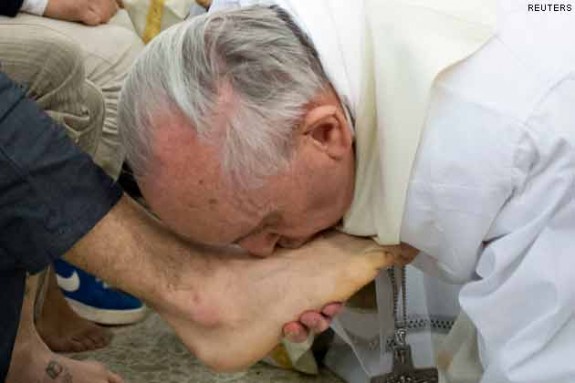John Allen, wrapping up his visit to Argentina, draws some interesting conclusions about the new pope from those who know him best:
I arrived in Argentina under the assumption that what we’ve seen from Pope Francis so far is mostly a matter of style, and that the real substance of his papacy is yet to come.
That is, things like spurning the papal limo, living in the Casa Santa Marta, and going to a youth prison for Holy Thursday struck me as preliminaries to the real heavy lifting — filling key Vatican positions, or responding to the child sexual abuse crisis and threats to religious freedom in various parts of the world.
People who know the pope best, however, insist that his opening act is a whole program of governance in miniature.
Bishop Jorge Eduardo Lozano of Gualeguaychú, Argentina, a close friend of Bergoglio who worked under him as an auxiliary in Buenos Aires for six years, told me that these gestures of humility and simplicity haven’t just been about the pope’s own personality.
“They’re actually an expression of his magisterium,” Lozano said Thursday afternoon, speaking at the headquarters of the Argentinian bishops’ conference.
“He’s sending a message to other cardinals, bishops and priests that this is what we need to do – to reach out to people, not being content to wait for them to come to us,” Lozano said. “More broadly, he’s sending the same message to all Catholics everywhere.”
In other words, Lozano insisted, these gestures aren’t just a charm offensive but an expression of a whole pastoral plan, offering a clear signal about where the new pope intends to carry the church.
There’s much more. Read it all.
In related news, Deacon Keith Fournier, adds this beautiful coda to the foot-washing kerfuffle:
Have you ever considered the significance of the fact that the same Jesus who promised to be with us always also told us that the poor would be with us always? That is because they are connected. Indeed, in a sense, they are one and the same – in a way that is revealed with the eyes of living faith. “The poor you will always have with you; but you will not always have me” (Jesus, Matthew 26:11) “And behold, I am with you always, until the end of the age.” (Jesus, Matthew 28:20)
The face of Jesus is found in the face of the poor, for those with eyes to see. The word of Jesus is spoken through the poor, for those who cultivate the ears to hear Him. The cry of Jesus is heard in the cry of the poor, at least for those who stop to listen. That is the deeper meaning behind this sobering scene recounting the last judgment recorded by the Evangelist Matthew in the 25th Chapter of his Gospel:
“Then the king will say to those on his right, ‘Come, you who are blessed by my Father. Inherit the kingdom prepared for you from the foundation of the world. For I was hungry and you gave me food, I was thirsty and you gave me drink, a stranger and you welcomed me, naked and you clothed me, ill and you cared for me, in prison and you visited me.’
“Then the righteous will answer him and say, ‘Lord, when did we see you hungry and feed you, or thirsty and give you drink? When did we see you a stranger and welcome you, or naked and clothe you? When did we see you ill or in prison, and visit you?’And the king will say to them in reply, ‘Amen, I say to you, whatever you did for one of these least brothers of mine, you did for me.'”
Those who love the poor – like Jesus loved the poor- are given as a gift and instruction manual for the rest of us. They are a sign of the kingdom, making it present in their wake. We have a Pope named Francis who taught us in prophetic action in that visit to the Jail on Holy Thursday. As he washed the feet of those prisoners, he washed the feet of Jesus with an alabaster flask of ointment and tears. So, I ask, whose feet did Pope Francis really wash? He washed the feet of Jesus.












